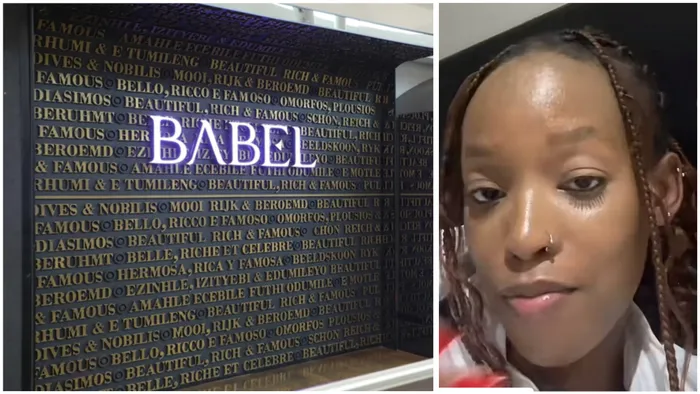The power of TikTok: How one brave waitress exposed the restaurant industry

Mihlali Nobavu spoke out about alleged exploitative labour practices at the Babel restuarant in Menlyn, leading to authorities intervening swiftly.
Image: Oupa Mokoena/Independent Newspapers and Screenshot/Tiktok
In 2024, one of the most significant stories to emerge from social media wasn’t a viral dance trend or celebrity gossip but it was an unexpected exposé that uncovered labour exploitation in South Africa’s restaurant industry.
Mihlali Nobavu, a former waitress at the popular Babel Restaurant, used the power of TikTok to shine a light on the poor working conditions and exploitation that she and other staff members faced.
Her video not only sparked outrage but also started a bigger conversation about workers’ rights, leading to a major investigation and, ultimately, regulatory actions in the restaurant sector.
To most people, TikTok is there for entertainment.
People scroll for hours watching hilarious stories, sometimes tricky dance moves, memes and viral challenges.
But in recent years, the platform has evolved into a space where people can share serious and sometimes life-altering stories as well.
In the case of Nobavu, the frustrated waitress used the platform to share her first-hand experience of the exploitation faced by staff at Babel, a high-end restaurant known for its trendy atmosphere.
In her viral video, she detailed how workers were subjected to long hours, minimal pay, and unjust treatment by management.
She exposed practices like withholding tips, forcing staff to work overtime without compensation, and creating an unsafe working environment.
By posting her story, Nobavu wasn’t just airing grievances, she was raising awareness of issues within an industry.
Her viral TikTok video quickly gained traction and garnered millions of views and prompted a nationwide conversation about labour rights.
The speed at which her video spread is a testament to TikTok’s power in amplifying voices that would otherwise remain unheard.
In just a few days, other employees began sharing their own experiences at Babel and other restaurants across the country.
This online outcry forced policymakers, the public, and the media to take a closer look at the issues plaguing the restaurant industry.
Nobavu’s exposé did not just lead to outrage across all social media platforms but it also prompted responses from local authorities.
Following the viral video, the Department of Labour launched a series of investigations into Babel and other restaurants.
The government’s intervention was a direct result of the public’s demand for accountability and transparency in the restaurant industry.
As investigations unfolded, it became clear that the mistreatment of workers was not only happening at Babel.
Many restaurants in South Africa, particularly high-end establishments, were found to be violating basic labour laws, such as failing to provide fair wages, proper working hours, and safe working conditions.
In response, the government clamped down on the industry, introducing stricter regulations aimed at improving workers’ rights and ensuring better enforcement of existing labour laws.
In addition to increased inspections, the government introduced a series of reforms designed to protect workers in the hospitality sector.
The pressure from social media, combined with public outcry, proved to be a powerful catalyst for meaningful change in the industry.
Nobavu’s courage in sharing her story on TikTok had a ripple effect beyond the restaurant industry.
Her actions highlighted the vital role that social media platforms, especially TikTok, play in raising awareness especially when traditional channels may be slow to act.
As we reflect on 2024, the Babel restaurant scandal serves as a powerful reminder of how social media can be harnessed for social good.
Nobavu’s TikTok videos not only brought attention to the exploitation of workers but also triggered systemic change that will benefit countless employees in the restaurant industry for years to come.
In a world increasingly dominated by digital platforms, TikTok has proven itself to be more than just a space for entertainment.
IOL